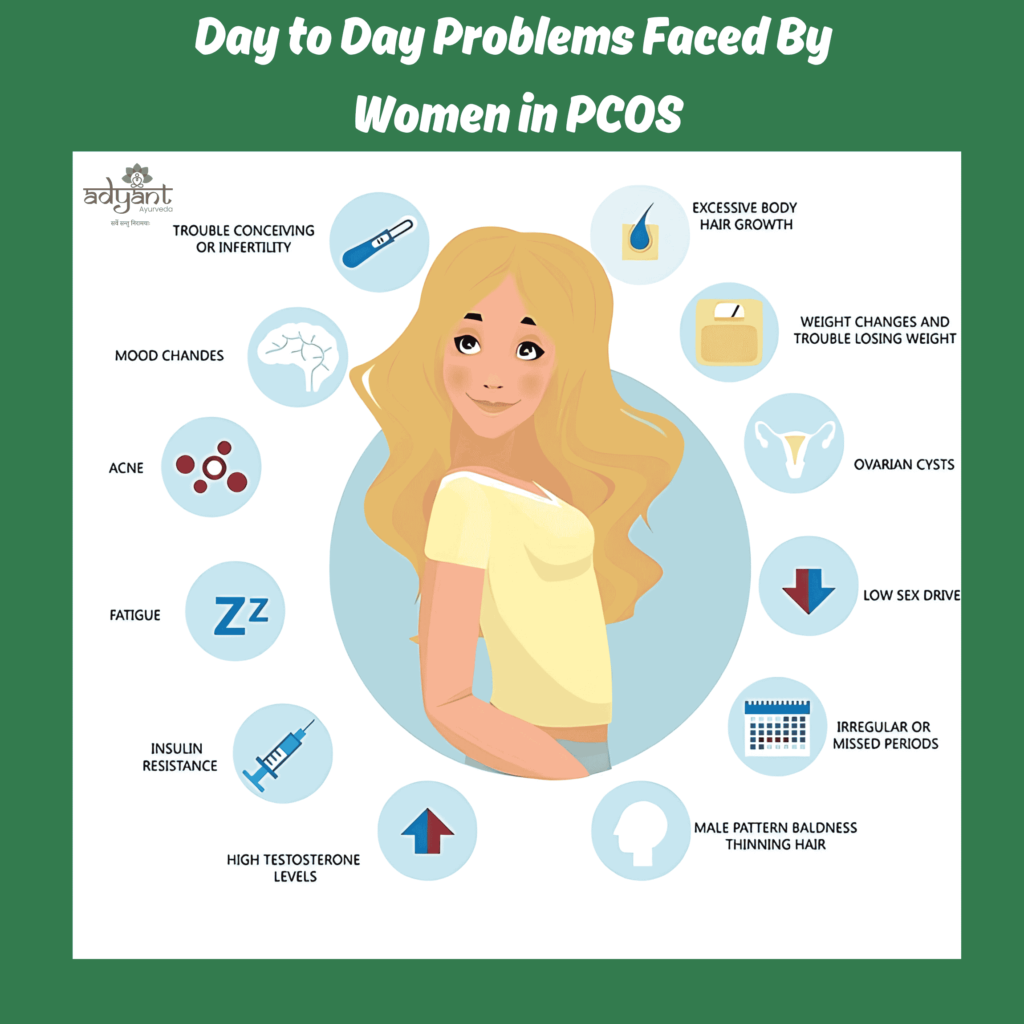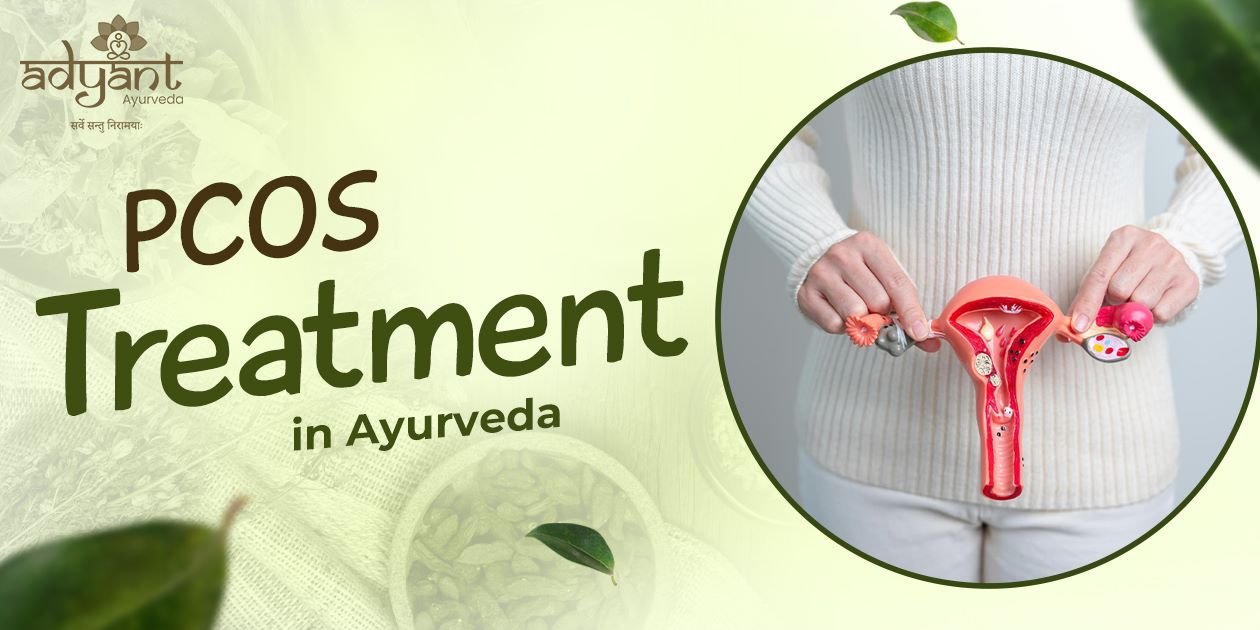Table of Contents
Toggle
🌿 Ayurvedic Treatment for PCOS: A Holistic Healing Approach Backed by Experience & Evidence
🔹 What is PCOS?
Polycystic Ovary Syndrome (PCOS) is one of the most common endocrine disorders affecting 1 in 10 women globally. It manifests as a combination of irregular menstrual cycles, hyperandrogenism (excess male hormones), and polycystic ovaries. PCOS can lead to weight gain, infertility, insulin resistance, acne, hirsutism, mood swings, and long-term complications like Type 2 diabetes and endometrial cancer.
🔹 Etiology of PCOS (Causes)
➔ Modern Viewpoint:
Genetic Predisposition: PCOS often runs in families.
Insulin Resistance: A major driver behind androgen excess and ovulatory dysfunction.
Hormonal Imbalances: Elevated LH, lowered FSH disrupt ovulation.
Chronic Inflammation: Contributes to cyst formation and hormonal imbalance.
Environmental Endocrine Disruptors: BPA, AGEs worsen PCOS.
➔ Ayurvedic Viewpoint:
Dosha imbalance: Primarily Kapha-Vata, sometimes involving Pitta.
Disturbed Agni (digestive fire) leading to Ama (toxins).
Obstruction in Artavavaha Srotas (reproductive channels).
Dhatu dushti: Mainly Rasa, Rakta, Meda, and Artava.
🔹 Diagnostic Criteria for PCOS
According to Rotterdam Criteria, PCOS is diagnosed if any two out of three features are present:
Irregular or absent ovulation
Signs of hyperandrogenism (acne, hirsutism, alopecia)
Polycystic ovaries on ultrasound
Additional Lab Evaluations:
LH/FSH Ratio > 2.5
Elevated Anti-Mullerian Hormone (AMH)
USG findings of “string of pearls”
Elevated insulin, androgens or testosterone
🔹 PCOS Evaluation: Clinical & Diagnostic
✔ Physical Examination:
BMI and waist-to-hip ratio
Hirsutism (Ferriman-Gallwey Score)
Acne, Acanthosis Nigricans, Hair loss
✔ Lab Investigations:
Hormonal: LH, FSH, Prolactin, TSH, AMH
Androgens: Total testosterone, DHEA-S
Metabolic: Fasting insulin, glucose, HbA1c
Others: 17-OH progesterone to rule out CAH
✔ Imaging:
Transvaginal or pelvic ultrasound
🔹 Differential Diagnosis of PCOS
Congenital Adrenal Hyperplasia (CAH)
Cushing’s Syndrome
Hypothyroidism
Hyperprolactinemia
Androgen-secreting tumors
🔹 Symptoms of PCOS
Physical Metabolic Emotional Irregular periods Insulin resistance Anxiety & depression Acne & oily skin Weight gain Mood swings Excess facial hair Fatty liver Low self-esteem Hair thinning High cholesterol Sleep disturbances Infertility Type 2 diabetes 
🔹 Ayurvedic Pathogenesis (Samprapti) of PCOS
Stage-wise Progression:
Agnimandya → Weak digestion leads to Ama
Kapha aggravation blocks Artavavaha Srotas
Vata gets obstructed, leading to ovulation failure
Meda dhatu accumulation → cyst formation, obesity
Pitta vitiation causes inflammation and hormonal disturbance
Ayurvedic Correlations:
Artava Kshaya – Low menstrual flow
Anartava / Arajaska – Amenorrhea
Vandhya – Infertility
Granthibhuta Artava – Cyst formation
Medoroga – Obesity-related disorders
🔹 Ayurvedic Treatment for PCOS: A Multi-Pronged Strategy
1. Shodhana (Panchakarma Detoxification)
Therapy Purpose Virechana Pitta-Kapha detox, improves liver metabolism Basti (Yoga Basti) Regulates Vata, restores hormonal balance Udvartana Reduces obesity and insulin resistance Nasya, Shirodhara Manages stress and neuro-hormonal regulation Case Insight: Yoga Basti using Sahacharadi Taila, Erandamooladi Niruha Basti, and Matra Basti provided excellent results in regulating menstruation and reducing weight.
2. Shamana (Internal Medications)
🔸 Classical Formulations:
Kanchanara Guggulu
Sukumara Kashaya
Kumaryasava, Dashmoolarishta
Ashokarishta, Rajahpravartini Vati
Triphala Churna
🔸 Single Herbs:
Herb Action Ashwagandha Adaptogen, reduces cortisol and anxiety Shatavari Regulates menstrual cycles, boosts fertility Guduchi (Giloy) Insulin sensitizer, detoxifier Latakaranj Ovulation inducer Shivlingi Seeds Fertility booster Trikatu & Chitrakadi Vati Digestive stimulant Case Insight: A combination of Shatavari, Shivlingi, Satapuspa, and Latakaranj regulated cycles in a patient with 60+ day gaps.
🔹 Diet & Lifestyle Recommendations for PCOS
✔ Do’s:
Warm, freshly cooked light meals
Whole grains, leafy greens, lentils
Spices like cumin, turmeric, ginger, cinnamon
Yoga: Baddha Konasana, Dhanurasana, Surya Namaskar
Pranayama & Meditation
❌ Don’ts:
Cold, dairy-heavy, sugary or fried foods
Long gaps between meals or skipping meals
Daytime sleeping, staying up late
🔹 Ayurvedic Case Studies Show Real Results
Outcome Duration Treatment Used Regular cycles, 5kg weight loss 3 months Panchakarma + Kanchanara Guggulu + Kumaryasava Menses normalized, acne reduced 45 days Sukumara Kashaya + Yoga Basti Ovulation restored naturally 1 month Shatavari combo + Rasayanas 🔹 Why Choose Adyant Ayurveda for PCOS Treatment?
✅ 24+ Years of Panchakarma Expertise
✅ Personalized PCOS Protocols
✅ 4 Clinics Across Bangalore (Jayanagar, Indiranagar, Kalyan Nagar, RR Nagar)
✅ Awarded for Excellence in Panchakarma
✅ Team of Experienced Female Ayurveda Doctors
✅ Online Consultations & App-based Medicine Delivery
🌟 Best Ayurvedic Doctors in Bangalore for PCOS Treatment
Looking for the best Ayurvedic doctors in Bangalore for PCOS? Meet the trusted specialists at Adyant Ayurveda, known for their expertise in reversing PCOS naturally. Our senior consultants bring over 24 years of clinical excellence in women’s health and hormone balancing:
👩⚕️ Dr. Shree Lakshmi – Senior Consultant at Jayanagar, expert in infertility and hormonal disorders
👩⚕️ Dr. Sumana – Specialist at Indiranagar, known for her compassionate PCOS treatment plans
👩⚕️ Dr. Vidya – Leading physician at Kalyan Nagar, experienced in managing chronic PCOS and insulin resistance
👩⚕️ Dr. Preethi – Expert at Rajarajeshwari Nagar, focuses on holistic women’s wellness and personalized Panchakarma
✨ Whether you’re facing irregular periods, infertility, or metabolic imbalance, our doctors blend classical Ayurveda with modern diagnostics to treat the root cause of PCOS—ensuring natural healing, cycle regulation, and improved fertility.
📞 Book your consultation today to begin your journey toward hormonal harmony.
🔹 Conclusion: Healing PCOS Naturally is Possible
PCOS may be complex, but it’s not unbeatable. Ayurvedic treatment doesn’t just suppress symptoms — it restores balance, rejuvenates the reproductive system, and supports long-term hormonal health.
📞 Book Your Consultation Today
💬 Call: +91 9972541009
🏠 Visit Any of our Bangalore branches
📏 Website: www.adyantayurveda.com
You can also read
🔹 Frequently Asked Questions (FAQs)
Q1. Can PCOS be cured permanently with Ayurveda?
While PCOS is considered a chronic condition, Ayurvedic treatments can help manage the root cause by detoxifying the body, balancing hormones, improving ovulation, and regularizing cycles. Long-term commitment to Ayurveda can help reverse symptoms naturally.
Q2. How long does it take to see results from Ayurvedic PCOS treatment?
Results vary based on body type, severity, and adherence. On average, most patients see positive changes within 1–3 months with consistent treatment, diet, and Panchakarma support.
Q3. Is Panchakarma necessary for all PCOS cases?
Not always. Panchakarma is recommended in moderate to severe PCOS or when there is ama (toxin) accumulation, obesity, or metabolic resistance. Mild cases may respond to internal medication and lifestyle correction alone.
Q4. Are there any side effects to Ayurvedic treatment?
When supervised by a qualified Ayurvedic physician, treatments are safe and natural. Self-medication is discouraged. Herbs and therapies are personalized according to your constitution.
Q5. Can Ayurveda help with PCOS-related infertility?
Yes. Ayurvedic protocols like Rasayana therapy, ovulation-stimulating herbs (e.g., Latakaranj, Shivlingi), and Panchakarma therapies have shown excellent results in restoring fertility and natural conception.






